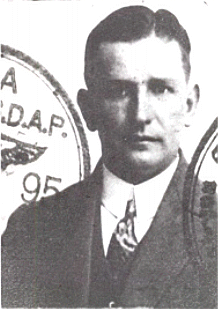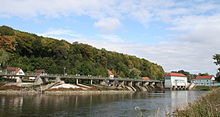Arno Fischer (technician)
Arno Fischer (born October 12, 1898 in Neustadt near Coburg ; † November 27, 1982 in Rottenbuch ) was a mechanical engineer and German politician ( NSDAP ).
Life
Arno Fischer was born out of wedlock in 1898 and attended the Volks- und Gewerbeschule in Neustadt bei Coburg. After an apprenticeship as a machine fitter, he took part in the First World War from June 1917 . After that he was a member of the Reichswehr Brigade of the voluntary state hunter corps until the end of August 1919 . In the 1920s, Fischer worked in various mechanical engineering workshops. At the beginning of 1931 he ran a motor vehicle repair shop and driving school in Coburg .
Fischer was a member of the DNVP from 1919 to 1929 . On May 1, 1930, he joined the NSDAP (membership number 235.534) and in November 1931 the SA (standard 95). In the party he worked in Coburg as a district office manager and was promoted to storm leader in the SA at the end of 1933. In May 1932, Fischer was hired as a works construction officer in Coburg , which was ruled by the NSDAP, and worked as works manager for the city's electricity works . There he was in charge of the construction of the Hausen am Obermain hydropower plant , which went into operation in September 1934.
In March 1933, Fischer became a deputy special commissioner in the Coburg district office. He was responsible for the arrests and interrogations of opponents of the regime and Jews , whereby the prisoners were usually mistreated.
After the former mayor of Coburg, Franz Schwede , was appointed Gauleiter in Gau Pomerania by Adolf Hitler in July 1934 , Fischer followed him in November 1934 and became a state building officer. In the party he was in Pomerania as Gauamtsleiter of the office for technology in Gau Pommern, in the SA he was promoted to Sturmbannführer until May 1937.
Schwede supported Fischer in Pomerania by providing a large number of employees for the development of an underwater power plant. This resulted in the construction of the Rostin an der Persante hydropower plant , which Nazi propaganda celebrated as the first underwater power plant in the world. The construction is characterized by a power house, which is housed in the flooded defense structure. Fischer designed it from the well-known elements of the weir power plant and the bulb turbine with the generator within a closed capsule housing. He applied for the patent on October 24, 1935, but it was not granted until November 23, 1944.
Due to problems with the heating of the encapsulated generator, Fischer arranged the rotor of the generator as an outer ring at the ends of the fixed rotor blades, as already shown in earlier US patents, and patented this design in 1936. The power plant in Maria Steinbach an der Iller , which was built from 1937 and inaugurated on July 11, 1938 , was the first to be equipped with four Arno Fischer turbines named after him, i.e. horizontally positioned propeller turbines with ring generators ( Straflo turbine ) .
In January 1937, Fischer moved to the Bavarian state service in Munich. At the end of July 1937 he became head of the group for hydraulic engineering, hydropower utilization and energy supply in the State Ministry of the Interior. His superior and mentor was the then Interior Minister and Gauleiter Adolf Wagner . On January 30, 1938, he was awarded the NSDAP's Golden Decoration . Fischer was appointed Ministerialrat in the Bavarian State Ministry of the Interior on July 5, 1938 , and in July 1939 was appointed head of the ministerial construction department and in the same year by Fritz Todt as "Special Representative for all questions relating to water management" in the Main Office for Technology of the Reich leadership of the NSDAP .
Due to his high administrative position - and if appropriate, also with the help of the NSDAP - Fischer implemented his concept of the underwater power plant in Bavaria, although the construction method was very uneconomical compared to the classic with Kaplan turbines for rivers with seasonal fluctuations in water volume, especially because of the necessity of many small turbines. With two large Kaplan turbines, z. B. the electricity production in Maria Steinbach by 22% higher.
Fischer had the design work and the overhead management of the construction of the underwater power plants rewarded accordingly, for example with 100,000 RM at the Saalach power plant in Rott. In addition, he founded the Arno Fischer Forschungsstätte GmbH together with Schwede and Wagner in 1940 . The hydraulic engineering research institute should, among other things, evaluate its inventions. It was initially based in Oberföhring and was relocated to the construction site of the Oberilzmühle power station in Hals in 1943 .
After strong criticism from the professional world of Fischer's power plant concept, Adolf Hitler set up a committee of inquiry. As a result, Fischer, who had previously been promoted to Ministerial Director on April 12, 1941 , was given leave of absence in 1941 and gave up his post in the Ministry of the Interior on June 10, 1942. From March 1940 he was chairman of Rhein-Main-Donau AG and until 1943 member of the board of directors of Bayernwerk .
In total, during his official activity in the Ministry of the Interior, Fischer had promised or had already approved 83 power plant projects; 64 should ultimately be implemented according to its design. By 1948, 15 of the 17 planned systems had been built, mainly on the upper reaches of the Iller and Lech . In addition, Fischer had registered 63 patents within nine years.
After the Second World War , the French occupying forces arrested Fischer on May 26, 1945 and transferred him to Ludwigsburg , where he was interned until March 1, 1947. After being arrested for infidelity in July 1947, Fischer fled to Paris in May 1948, which he left for Saarbrücken in 1951 in order to evade legal responsibility for his actions, because on November 12, 1948, in Munich, he was absent as the main culprit in a panel proceedings Sentenced to six years in a labor camp , confiscated assets and ten years off the job . The Appeals Chamber confirmed the judgment on March 10, 1950. Among other things, the reasoning states: “As far as the extent of the benefit that the person concerned has drawn for himself and for others from his connection with the National Socialist tyranny, this cannot be precisely quantified. All in all, it is a matter of millions ”. Fischer returned to Germany in the mid-1950s after most of the sentences were waived. A preliminary investigation from 1964 against Fischer for the murder of four concentration camp prisoners who worked in his research facility in Hals and who were shot while trying to escape in 1944 was discontinued in 1965 because of unproven involvement.
literature
- Martin Gschwandtner: Once upon a time there was a coal theft - technology under the yoke of the Nazi dictatorship Arno Fischer and the wrong track of underwater power plants in the period from 1933 to 1945 . Grin Verlag, Norderstedt 2009, ISBN 978-3-640-56524-5 .
Web links
- Joachim Lilla: Fischer, Arno. In: ders .: Minister of State, senior administrative officials and (NS) functionaries in Bavaria 1918 to 1945 (November 19, 2012)
Individual evidence
- ↑ Harald Sandner: Coburg in the 20th century. The chronicle of the city of Coburg and the House of Saxe-Coburg and Gotha from January 1, 1900 to December 31, 1999 - from the "good old days" to the dawn of the 21st century. Against forgetting. Verlagsanstalt Neue Presse, Coburg 2002, ISBN 3-00-006732-9 , p. 310.
- ^ Joachim Albrecht: The avant-garde of the Third Reich - The Coburg NSDAP during the Weimar Republic 1922-1933 . Peter Lang, European Science Publishing House, Frankfurt am Main 2005, ISBN 3-631-53751-4 , p. 186.
- ↑ Kyran T. Inachin: The Pomeranian Gau - a Prussian province as a Nazi Gau. In: Jürgen John, Horst Möller, Thomas Schaarschmidt (eds.): The NS-Gaue: regional middle instances in the centralized "Führer state". (= Series of the quarterly books for contemporary history. Special issue ). Oldenbourg Wissenschaftsverlag, Munich 2007, ISBN 978-3-486-58086-0 , p. 280.
- ↑ Reich patent 760 140 for the floodable river power plant
- ↑ Patent DE718423 : Floodable underwater power plant for rivers. Registered on December 13, 1936 , published on March 11, 1942 , applicant: Arno Fischer, inventor: Arno Fischer.
- ↑ Christoph Wagner: Development, rule and fall of the National Socialist movement in Passau 1920 to 1945. Frank & Timme, Berlin 2007, ISBN 978-3-86596-117-4 , p. 392.
- ↑ Martin Gschwandtner: Once upon a time there was a coal theft - technology under the yoke of the Nazi dictatorship Arno Fischer and the wrong path of underwater power plants in the period from 1933 to 1945. 2009, p. 114.
| personal data | |
|---|---|
| SURNAME | Fischer, Arno |
| BRIEF DESCRIPTION | German politician (NSDAP) and SA leader |
| DATE OF BIRTH | October 12, 1898 |
| PLACE OF BIRTH | Neustadt near Coburg |
| DATE OF DEATH | November 27, 1982 |
| Place of death | Rottenbuch |



